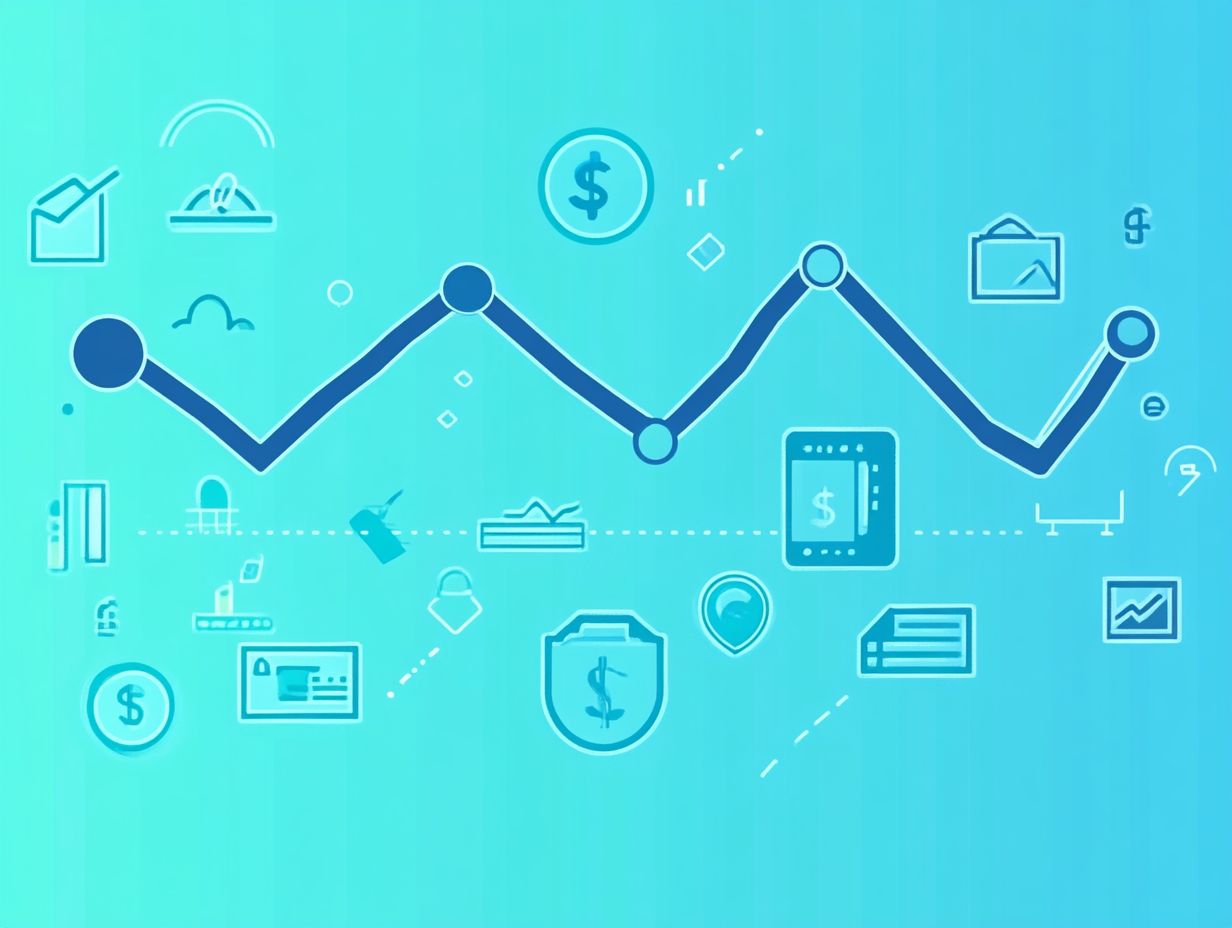Credit Score Trends: What to Expect in 2024
Understanding your credit score is not just important it’s your ticket to better financial opportunities! Let’s dive into why these numbers matter and how you can boost them for a brighter financial future.
Credit scores play a significant role in everything from loan approvals to interest rates, making them essential for your financial well-being.
This article delves into why credit scores matter, highlighting current trends and the various factors that influence them. You’ll find actionable tips for improving your score, along with insights into what the future may hold for credit metrics.
As you look ahead to 2024, now is the ideal moment to prepare and elevate your credit profile, unlocking greater financial opportunities for yourself.
Contents
- Key Takeaways:
- The Importance of Credit Scores
- Current Credit Score Trends
- Factors Affecting Credit Scores
- How to Improve Your Credit Score
- The Future of Credit Scores
- Preparing for 2024: What You Can Do Now
- Frequently Asked Questions
- What is the current trend for credit scores in 2024?
- Will there be changes in credit score factors in 2024?
- How will the pandemic affect credit scores in 2024?
- Are new technologies affecting credit score trends in 2024?
- Will credit score requirements for loans change in 2024?
- What can individuals do to improve their credit scores for 2024?
Key Takeaways:

- 1. Credit scores are crucial for financial stability and impact loan approvals, interest rates, and even job opportunities.
- 2. Recent credit score trends show increasing average scores and potential changes in the credit scoring system by 2024.
- 3. Payment history, credit utilization, and credit mix are key elements that can significantly affect credit scores.
The Importance of Credit Scores
Credit scores serve as essential indicators of your financial health, showing your borrowing history and overall economic activity. Scores like the FICO Score and VantageScore are employed by financial institutions, including banks and credit unions, to evaluate your loan eligibility and borrowing criteria.
This greatly influences your financial decisions. The Federal Reserve, through its Board of Governors, closely monitors these credit trends, offering valuable economic data that shapes consumer credit assessments and loan applications.
Understanding this system enables you to make informed choices regarding your financial future.
Why Credit Scores Matter
Credit scores are essential tools for financial institutions when assessing loan applications. They play a pivotal role in determining the interest rates available to you.
A strong credit score can unlock the door to more favorable terms. This allows you to secure auto loans at lower interest rates, leading to significant savings over the life of the loan.
When it comes to student loans, those with higher scores typically enjoy reduced rates, making their repayment journey much more manageable.
Maintaining a healthy credit profile requires careful attention to your credit utilization levels the amount of credit you use compared to your total credit limit and a consistent payment history.
By focusing on these key factors, you can elevate your creditworthiness, paving the way for enhanced financial opportunities and access to a wider array of loan products.
Current Credit Score Trends
As of May 2024, current credit score trends reveal notable shifts in consumer behavior and financial stability. This insight comes from sophisticated data visualization tools and the latest economic data released by the Federal Reserve.
Recent Changes and Predictions
Recent changes in credit scores, particularly with FICO Score and VantageScore metrics, reflect broader economic shifts that are influencing your financial health.
These evolving standards now incorporate new data points, such as payment histories and credit utilization rates, providing a more nuanced understanding of your creditworthiness.
Such adjustments carry significant implications for you, especially if you have a limited credit history or have faced financial challenges in the past.
As economic activity begins to rebound, experts predict that interest rates will rise. This could further strain your credit profile.
Financial institutions will need to adapt by refining their lending practices and offering customized products to meet these new demands. This ultimately reshapes the future landscape of credit scores for you and others navigating this dynamic environment.
Factors Affecting Credit Scores

Several crucial factors influence your credit score. These include your payment history, credit utilization, loan terms, and the mix of credit accounts you hold.
The frequency of credit inquiries also significantly affects your credit profile. Existing delinquencies play a significant role in shaping your overall credit profile.
In conclusion, take steps towards improving your credit score today. By understanding these crucial elements and monitoring your credit behavior, you can enhance your financial future.
Key Elements That Impact Scores
Key elements that impact credit scores include your credit history, credit utilization ratio, payment history, outstanding balances, and the important distinctions between revolving and non-revolving credit.
Understanding these components is crucial for effective credit management. For instance, your payment history alone accounts for 35% of your credit score. This makes timely payments absolutely essential.
Meanwhile, your credit utilization ratio, which is the amount of credit you use compared to your total credit limit, should ideally stay below 30% for optimal scores. Exceeding this threshold can signal an overreliance on credit and negatively influence your assessments.
You should prioritize systematically paying down outstanding balances and regularly check your credit reports for accuracy. Any erroneous information can derail your scores. Distinguishing between revolving credit like credit cards and non-revolving credit, such as mortgages, helps you strategize your credit use effectively.
How to Improve Your Credit Score
Boosting your credit score is an exciting journey that starts with a solid plan! Enhancing your score demands a thoughtful strategy that includes diligent credit monitoring, setting up credit-building loans, and taking charge of your financial health.
Addressing late payments and optimizing your credit utilization rate are essential steps in this process, ensuring you build a robust credit profile.
Tips and Strategies for Boosting Scores
To effectively boost your credit score, consider embracing smart budgeting techniques, minimizing credit inquiries, and ensuring timely debt payments.
One powerful strategy is to set up automated payments for your bills and loans; this way, you ll never miss a due date again. A solid understanding of loan terms enables you to select the right credit products that align perfectly with your financial goals.
Take advantage of tools offered by financial institutions, such as free credit monitoring services. These can provide valuable insights into your spending habits and pinpoint areas for improvement. For example, someone who previously carried high credit card balances managed to raise their score by consistently paying down debt and keeping their utilization below 30%.
Monitoring fluctuations in your credit score while following these practices clearly demonstrates how proactive management can lead to substantial improvements over time.
The Future of Credit Scores
The future of credit scores appears bright as emerging models like FICO and VantageScore refine their approaches. By integrating new data points, these evolving systems enhance transparency and accessibility in consumer finance, ultimately enabling you to navigate your financial landscape with greater confidence.
Expected Changes and Implications

Expected changes in credit scores could significantly reshape the borrowing landscape for you, influencing interest rates, loan eligibility, and the overall dynamics of consumer credit.
These shifts may lead to unique experiences depending on your credit profile, particularly affecting those with limited or poor credit histories. Lenders might start reevaluating their criteria to welcome a broader range of applicants, potentially providing more flexible options for individuals once considered high-risk.
As financial institutions respond to these changes, they may adopt alternative assessment methods that look beyond traditional credit scores. This shift could create a more inclusive environment, giving individuals from diverse backgrounds better access to essential financing and fundamentally transforming the borrowing experience for many.
Preparing for 2024: What You Can Do Now
Preparing for 2024 requires you to take proactive steps to elevate your credit score. By aligning it with your financial goals, you set yourself up for success and create favorable conditions for any upcoming loan applications.
Steps to Take for a Better Credit Score in the Future
Taking proactive steps today can lead to a better credit score. This will enhance your financial stability and boost your chances of loan approval.
Start by creating a simple budget. This helps you manage your expenses and frees up funds to pay off any outstanding debts.
Use credit monitoring tools to track your credit score. These tools can show your credit report, point out errors, and suggest ways to improve your score.
Understanding loan terms is crucial. Knowing about interest rates and repayment schedules helps you avoid financial strains.
Adopting responsible credit management practices is essential. This is important for meeting immediate financial needs and achieving your long-term financial goals.
Frequently Asked Questions
What is the current trend for credit scores in 2024?
Credit scores have been steadily rising since 2017. This trend is expected to continue into 2024, although some fluctuations are likely due to economic factors. For insights on what’s ahead, check out the future of credit scoring.
Will there be changes in credit score factors in 2024?
Slight changes might occur in how credit factors are weighted. However, the main factors will likely stay the same: payment history, credit use, the length of credit history, and types of credit.
How will the pandemic affect credit scores in 2024?
The pandemic may temporarily impact scores as some may struggle financially. However, as the economy bounces back, scores are expected to improve.
Are new technologies affecting credit score trends in 2024?
Technologies like AI and alternative data may change how scores are calculated. Yet, these changes are unlikely to drastically impact trends in 2024.
Will credit score requirements for loans change in 2024?
Predicting exact changes in credit score requirements for loans is challenging. If scores continue to rise, lenders might raise their minimum requirements.
What can individuals do to improve their credit scores for 2024?
The best way to boost your credit score is to make on-time payments consistently. Keep balances low on credit cards and check your credit reports for any errors.






